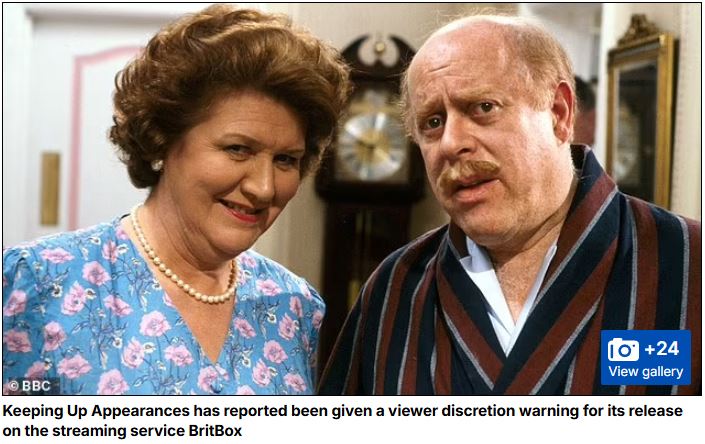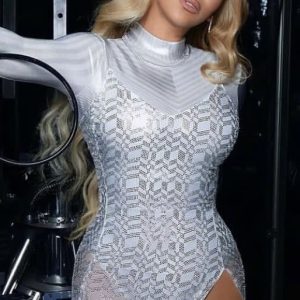BritBox Adds Viewer Discretion Warning to Keeping Up Appearances: The Evolving Legacy of a British Comedy Icon
In a move that has reignited the ever-evolving conversation around classic TV and modern sensibilities, the beloved British sitcom Keeping Up Appearances has now been tagged with a viewer discretion warning on the streaming platform BritBox. Known for its iconic portrayal of social-climbing Hyacinth Bucket—pronounced “Bouquet”—the comedy has delighted audiences for over three decades. But as societal standards shift, even the genteel misadventures of Hyacinth and her reluctant husband Richard are now being reconsidered through a contemporary lens.
BritBox, the joint streaming service from ITV and the BBC, issued a content advisory stating that the series “contains language and attitudes of the era that may offend.” This follows similar disclaimers recently added to other classic British comedies, including The Good Life, Fawlty Towers, and Dad’s Army.
The Offending Content: When Laughter Ages Poorly
The flagged episodes in Keeping Up Appearances include moments of humor that are now viewed as culturally insensitive. One particular storyline involves jokes targeting a Polish immigrant, where multiple characters question the individual’s right to reside in the UK. Another episode features a scene where Hyacinth, encountering a well-spoken gentleman in the countryside, quips to her husband that he is “quent”—an antiquated slang meant to denote someone effeminate or posh—as in “quent as a £4 note.”
While such lines may have once been brushed off as harmless British wit, today they sit under scrutiny for perpetuating stereotypes and contributing to cultural microaggressions. And in today’s viewing climate, intent is not always enough to excuse impact.
Hyacinth Bucket: A Comic Legend in Changing Times
Running from 1990 to 1995, Keeping Up Appearances became a staple of British television, featuring Dame Patricia Routledge in the career-defining role of Hyacinth, an overbearing, self-important woman desperate to present herself as upper-class. Her attempts at refinement are constantly undermined by her long-suffering husband Richard (Clive Swift) and her “common” relatives—Daisy, Onslow, Rose, and sister Violet, who famously has “a Mercedes, a sauna, and room for a pony.”
The comedy of the show lies in Hyacinth’s delusion, her pursuit of status, and the chaos that inevitably follows her attempts at perfection. Routledge’s portrayal earned her a place in British pop culture history, with Hyacinth Bucket becoming shorthand for social pretension and class anxiety.
But the show also relied on broad caricatures—of class, nationality, and gender—to land its jokes. And as society grows more sensitive to the representation of marginalized groups, even classic characters like Hyacinth are being viewed under a new critical light.
A Wider Trend: BritBox and the Legacy of British Comedy
BritBox’s move with Keeping Up Appearances is far from isolated. In recent months, the streaming service has added similar disclaimers to a wide array of beloved British comedies.
Last week, The Good Life—a gentle 1970s sitcom about suburban self-sufficiency—received a viewer warning after an episode featured the since-banned Robertson’s jam “Golly” badge on an apron worn by Penelope Keith’s character, Margo. While many viewers remember the series for its warm humor and social satire, the presence of racially insensitive imagery prompted the warning label, reading that the episode “contains offensive racial imagery.”
This cascading trend has also impacted Fawlty Towers, where racially charged remarks made by the character Major Gowen have been edited out in previous BBC airings, and Dad’s Army, whose 1971 film version now comes with a warning about “discriminatory language,” particularly the use of the term “fuzzy-wuzzies.”
Other series such as Porridge, Blackadder, The Royle Family, and even The Muppet Show have joined the list of classics now bracketed by cautionary notices. Streaming platforms, including Disney+ and BBC iPlayer, have taken preemptive steps to offer disclaimers that contextualize outdated or offensive humor.
A Divided Audience: Censorship or Cultural Awareness?
For many fans, these changes represent a sobering reminder that even the most nostalgic shows are products of their time—and that time has moved on.
Supporters of the disclaimers argue that they are essential for preserving the shows while acknowledging their problematic elements. Rather than removing the content entirely, the warnings allow viewers to make informed choices and engage with the material critically.
But not all viewers are pleased. Critics of the trend call it unnecessary censorship or suggest it erodes the value of comedy by reading it too literally. Actor and comedian John Cleese, star of Fawlty Towers, famously decried the editing of the Major’s lines, arguing that the show was clearly mocking the character’s outdated views, not endorsing them.
In the case of Keeping Up Appearances, the debate touches on the core of British humor itself—class satire, awkward politeness, and the absurdity of social climbing. But when the jokes veer into racial or gender-based stereotypes, even the cleverest writing isn’t immune from criticism.
The Legacy of Patricia Routledge and Her Timeless Snob

Despite these controversies, the cultural impact of Keeping Up Appearances and Patricia Routledge’s performance remains undisputed. Routledge, now 95, is a national treasure with an illustrious career on stage and screen. Her portrayal of Hyacinth Bucket wasn’t just a comedic triumph; it was a character study in insecurity and aspiration, wrapped in floral china and cringeworthy phone calls to “the vicar’s wife.”
Geoffrey Hughes, who played Onslow—Hyacinth’s boorish, beer-loving brother-in-law—passed away in 2012, but his legacy, like the rest of the cast’s, remains tightly woven into British television history.
As modern viewers revisit these shows, they do so with both affection and awareness. What was once taken for granted as harmless now requires context. And in offering that context, BritBox and similar platforms walk a careful line—balancing preservation with progress.
Looking Ahead: What Comes Next?
In the post-#MeToo and post-BLM era, audiences are reevaluating what entertainment should look like. While comedy remains a powerful tool for social commentary, it can also reflect the blind spots of its time.
As more classic shows are revisited, it’s likely that viewer advisories will become a permanent feature of streaming culture. Whether this signals the beginning of the end for certain vintage favorites—or a more thoughtful, nuanced appreciation of them—remains to be seen.
What is certain, though, is that the conversation is far from over. And as Keeping Up Appearances reminds us, even in the world of perfect floral arrangements and candlelight suppers, appearances can be deceiving.
Would you like this adapted for social media or published as part of a newsletter series on classic TV controversies?





